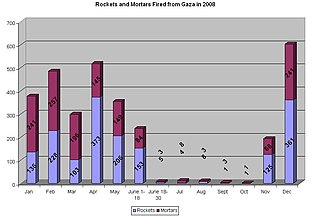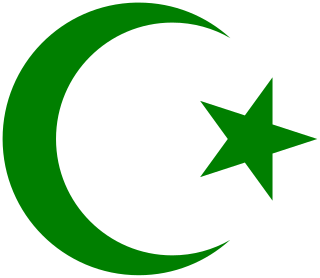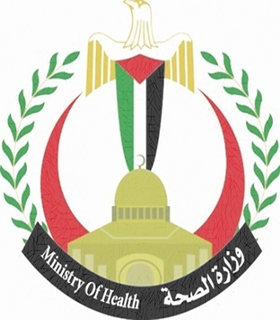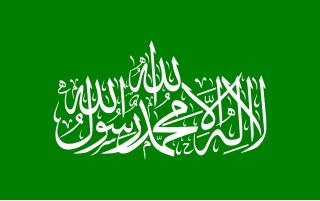Related Research Articles

The Gaza Strip, or simply Gaza, is a self-governing Palestinian territory on the eastern coast of the Mediterranean Sea, that borders Egypt on the southwest for 11 kilometers (6.8 mi) and Israel on the east and north along a 51 km (32 mi) border. Gaza and the West Bank are claimed by the de jure sovereign State of Palestine.

Hamas is a Palestinian Sunni-Islamic fundamentalist but pragmatic, militant, and nationalist organization. It has a social service wing, Dawah, and a military wing, the Izz ad-Din al-Qassam Brigades. It won the 2006 Palestinian legislative election and became the de facto governing authority of the Gaza Strip following the 2007 Battle of Gaza. Israel and Hamas have since engaged in several wars of varying intensity. Canada, the European Union, Israel, Japan and the United States classify Hamas as a terrorist organization. It is not considered a terrorist organization by Brazil, China, Egypt, Iran, Norway, Qatar, Russia, Syria and Turkey. Australia, New Zealand, Paraguay and the United Kingdom classify only its military wing as a terrorist organization. In December 2018, the United Nations General Assembly rejected a U.S. resolution condemning Hamas as a terrorist organization.

The Palestinian National Authority is the interim self-government body established in 1994 following the Gaza–Jericho Agreement to govern the Gaza Strip and Areas A and B of the West Bank, as a consequence of the 1993 Oslo Accords. Following elections in 2006 and the subsequent Gaza conflict between the Fatah and Hamas parties, its authority had extended only in areas A and B of the West Bank. Since January 2013, the Fatah-controlled Palestinian Authority uses the name "State of Palestine" on official documents.

Mahmoud al-Zahar is a Palestinian politician. He is a co-founder of Hamas and a member of the Hamas leadership in the Gaza Strip. Since the formation of the Hamas/"Change and Reform" government in the Palestinian National Authority in March 2006, al-Zahar has served as foreign minister in the government of prime minister Ismail Haniyeh. Prior to that he was seen as a major candidate among the Hamas members elected to the Palestinian Legislative Council for prime minister, as he was at that time the most senior official within the organization. His son, a member of the Hamas military wing, the Izz ad-Din al-Qassam Brigades, was killed by Israeli fire in Gaza on 5 January 2008.

The 2006 Israel–Gaza conflict, known in Israel as Operation "Summer Rains" was a series of battles between Palestinian militants and the Israel Defense Forces (IDF) during summer 2006, prompted by the capture of Israeli soldier Gilad Shalit by Palestinian militants on 25 June 2006. Large-scale conventional warfare occurred in the Gaza Strip, starting on 28 June 2006, which was the first major ground operation in the Gaza Strip since Israel's unilateral disengagement plan was implemented between August and September 2005.
The 2008 breach of the Gaza–Egypt border began on 23 January after Hamas militants in the Gaza Strip set off an explosion near the Rafah border crossing, destroying part of the 2003 wall. The United Nations estimates that as many as half the 1.5 million population of the Gaza Strip crossed the border into Egypt seeking food and supplies. Due to fears that militants would acquire weapons in Egypt, Israeli police went on increased alert.

The blockade of the Gaza Strip is the ongoing land, air, and sea blockade of the Gaza Strip imposed by Israel and Egypt in 2007, after Hamas took control of the Gaza Strip during the Battle of Gaza, seizing government institutions and replacing Fatah and other Palestinian Authority (PA) officials with Hamas members. Hamas had previously refused to accept the conditions set by Israel and the Quartet on the Middle East for continued aid to the PA under a Hamas government including recognition by Hamas of Israel, the disavowal of violent actions, and acceptance of previous agreements between Israel and the PA, including the Oslo Accords. After Hamas formed the PA government in March 2006, led by Ismail Haniya, Israel and the Quartet stopped having any dialogue with the PA and especially any member of the Hamas government, ceased providing aid to the PA and imposed sanctions against the PA.

The Gaza War, also known as Operation Cast Lead, also known in the Muslim world as the Gaza Massacre, and referred to as the Battle of al-Furqan by Hamas, was a three-week armed conflict between Gaza Strip Palestinian paramilitary groups and the Israel Defense Forces (IDF) that began on 27 December 2008 and ended on 18 January 2009 with a unilateral ceasefire. The conflict resulted in between 1,166 and 1,417 Palestinian and 13 Israeli deaths.

The 2008 Israel–Hamas ceasefire was an Egyptian-brokered six-month Tahdia "for the Gaza area", which went into effect between Hamas and Israel on 19 June 2008. According to the Egyptian-brokered agreement, Israel promised to stop air strikes and other attacks, while in return, there would not be rocket attacks on Israel from Gaza. Once the ceasefire held, Israel was to gradually begin to ease its blockade of Gaza.
The Gaza Mall is a shopping mall that opened in Gaza in July 2010.

Islamism in the Gaza Strip involves efforts to promote and impose Islamic laws and traditions in the Gaza Strip. The influence of Islamic groups in the Gaza Strip has grown since the 1980s. Following Hamas' victory in the 2006 Palestinian elections and a conflict with supporters of the rival Fatah party, Hamas took complete control of the Gaza Strip, and declared the "end of secularism and heresy in the Gaza Strip". For the first time since the Sudanese coup of 1989 that brought Omar al-Bashir to power, a Muslim Brotherhood group ruled a significant geographic territory. Gaza human-rights groups accuse Hamas of restricting many freedoms in the course of these attempts.

The 2006 Gaza cross-border raid was an armed incursion carried out by seven or eight Gazan Palestinian militants on 25 June 2006 who attacked Israel Defense Forces (IDF) positions near the Kerem Shalom Crossing through an attack tunnel. In the attack, two IDF soldiers and two Palestinian militants were killed, four IDF soldiers were wounded one of whom was Gilad Shalit who was captured and taken to the Gaza Strip.
The Hamas government of 2012 is the second Palestinian Hamas-dominated government, ruling over the Gaza Strip, since the split of the Palestinian National Authority in 2007. It was presented on 26 August 2012 and approved by the Gaza-based Hamas MPs from the Palestinian Legislative Council (PLC). Seven new ministers were appointed to the new government. Hamas PM Ismail Haniyeh said the new government's priorities would be "ending the siege [of the Gaza Strip] and easing the problems of citizens, especially with regard to electricity and water."

The Health Minister of the State of Palestine is Dr. Mai al-Kaila. The Health Minister heads the Ministry of Health of the State of Palestine, which changed its name from Ministry of Health of the Palestinian National Authority, following the November 29, 2012 vote in UN over upgrade of Palestine to non-member state status.

The governance of the Gaza Strip is carried out by the Hamas administration, led by Ismail Haniyeh, from 2007, until 2014 and again from 2016. The Hamas administration is often referred to as the Hamas government in Gaza.
The Battle of Gaza, also referred to as Hamas' takeover of Gaza, was a military conflict between Fatah and Hamas, that took place in the Gaza Strip between June 10 and 15, 2007. It was a prominent event in the Fatah–Hamas conflict, centered on the struggle for power, after Fatah lost the parliamentary elections of 2006. Hamas fighters took control of the Gaza Strip and removed Fatah officials. The battle resulted in the dissolution of the unity government and the de facto division of the Palestinian territories into two entities, the West Bank governed by the Palestinian National Authority, and Gaza governed by Hamas.

Ismail Abdel Salam Ahmed Haniyeh is a senior political leader of Hamas and formerly one of two disputed Prime Ministers of the Palestinian National Authority. Haniyeh became prime minister after Hamas won the Palestinian legislative elections of 2006. President Mahmoud Abbas dismissed Haniyeh from office on 14 June 2007 at the height of the Fatah–Hamas conflict, but Haniyeh did not acknowledge the decree and continued to exercise prime ministerial authority in the Gaza Strip. In September 2016, reports indicated Haniyeh would replace Khaled Meshaal as Chief of Hamas's Political Bureau. He was elected as Hamas political chief on 6 May 2017.

The 2014 Israel–Gaza conflict also known as Operation Protective Edge and sometimes referred to as the 2014 Gaza war, was a military operation launched by Israel on 8 July 2014 in the Hamas-ruled Gaza Strip. Following the kidnapping and murder of three Israeli teenagers by Hamas members, the IDF conducted Operation Brother's Keeper to arrest militant leaders, Hamas fired rockets into Israel and a seven-week conflict broke out. It was one of the deadliest conflicts between the Palestinians and Israeli in decades. The combined Israeli airstrikes and ground bombardment and Palestinian rocket attacks resulted in thousands of deaths, the vast majority of which were Gazans.

The Palestinian Unity Government of June 2014 was a national unity government of the Palestinian National Authority under Palestinian President Mahmoud Abbas formed on 2 June 2014 following the Fatah-Hamas Reconciliation Agreement that had been signed on 23 April 2014. The ministers were nominally independent, but overwhelmingly seen as loyal to President Abbas and his Fatah movement or to smaller leftist factions, none of whom were believed to have close ties to Hamas. However, the Unity Government was not approved by the Legislative Council, leading to its legitimacy being questioned. The Unity Government dissolved on 17 June 2015 after President Abbas said it was unable to operate in the Gaza Strip.
A Gaza–Israel conflict escalation began on 3 May 2019, after two Israeli soldiers were injured by sniper fire from the Gaza Strip during the weekly protests at the Gaza–Israel border. In response, the Israeli Air Force carried out an airstrike, killing two Palestinians. Following this, hundreds of rockets were launched from Gaza at Israel, while the Israeli Air Force struck numerous targets within the Gaza Strip. In addition, Israel increased its troop presence near the Israel–Gaza barrier.